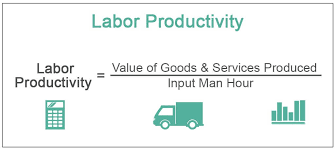
In a fast-paced, competitive global economy like ours, organizations are increasingly focused on enhancing labour productivity. However, this drive for higher productivity often raises important questions about the well-being of the workforce. Can we achieve significant productivity gains without compromising the health and happiness of employees? Let’s see how balancing productivity and well-being can lead to sustainable success for both workers and organizations.
The Productivity-Well-being Paradox

Traditionally, higher productivity has been equated with longer working hours and increased workloads. While this might lead to short-term gains, it often results in burnout, stress, and a decline in overall employee well-being. Over time, this paradox – where efforts to boost productivity inadvertently harm worker morale and health – can undermine the very productivity gains organizations seek.
The Importance of Work-life Balance
A key factor in maintaining workforce well-being is ensuring a healthy work-life balance. When employees have the time to rest, pursue personal interests, and spend time with family and friends, they are more likely to be engaged and productive at work. Companies that recognize this have implemented policies such as flexible working hours, remote work options, and generous vacation policies. These initiatives not only improve well-being but also enhance productivity by reducing absenteeism and turnover rates.

Source: WallStreetMojo
Workplace culture plays a crucial role in balancing productivity and well-being. A positive, inclusive, and supportive work environment fosters a sense of belonging and motivation among employees. When workers feel valued and appreciated, their job satisfaction and productivity levels increase. Organizations can cultivate such a culture by promoting teamwork, recognizing and rewarding achievements, and encouraging open communication.
Addressing Burnout

Burnout is a significant threat to both productivity and well-being. It manifests as chronic physical and emotional exhaustion, often caused by prolonged stress and overwork. To combat burnout, companies need to monitor workloads carefully and ensure employees are not consistently overburdened. Providing resources such as mental health support, wellness programs, and regular breaks can help employees manage stress and maintain their productivity.
Investing in Employee Development

Continuous professional development is another vital aspect of workforce well-being and productivity. Employees who have opportunities to learn new skills and advance their careers are more engaged and motivated. Organizations that invest in training, mentorship programs, and career development initiatives not only enhance their workforce’s capabilities but also boost overall productivity.
Technological Support
Leveraging technology can also help strike a balance between productivity and well-being. Tools such as project management software, automation, and artificial intelligence can reduce the burden of repetitive tasks, allowing employees to focus on more meaningful and creative work. Moreover, technology can facilitate remote work and flexible schedules, further supporting work-life balance.
Ultimately, the most effective strategy for balancing labour productivity and workforce well-being is a holistic one. This involves creating a work environment that supports both the physical and mental health of employees while also fostering a culture of high-performance and continuous improvement. By prioritizing well-being, organizations can build a more resilient, motivated, and productive workforce.
In conclusion, labour productivity and workforce well-being are not mutually exclusive goals. By recognizing the interdependence between the two, organizations can create a sustainable model of success that benefits both employees and the business. As we move forward in an increasingly competitive and dynamic world, finding this balance will be key to achieving long-term productivity gains and ensuring the well-being of the workforce.
Contributed by Agolo Eugene Uzorka, CEO/ Lead Consultant, Eugene + George Consulting Limited














